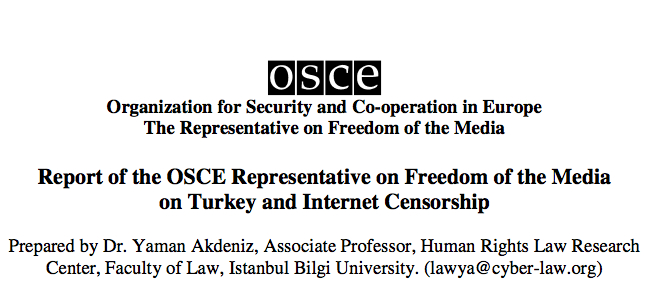Report of the OSCE Representative on Freedom of the Media on Turkey and Internet Censorship (PDF file)
Prepared by Dr. Yaman Akdeniz, Associate Professor, Human Rights Law Research Center, Faculty of Law, Istanbul Bilgi University.

Executive Summary
The following survey was commissioned by the office of the OSCE Representative on Freedom of the Media. It analyzes Law No. 5651, widely known as the Internet Law of Turkey which has served since 2007 as the basis of a mass blocking of websites in Turkey. The report offers recommendations on how to bring the law in line with international standards protecting freedom of expression. The aim of the survey is to provide a useful tool to the Turkish authorities in their current efforts to reform the much-debated legislation.
The Turkish government enacted Law No. 5651, entitled Regulation of Publications on the Internet and Suppression of Crimes Committed by means of Such Publication, in May 2007. The enactment of this law followed concerns about defamatory videos available on YouTube involving the founder of the Turkish Republic Mustafa Kemal Atatürk, combined with increasing concerns for the availability of child pornographic, and obscene content on the Internet, and websites which provide information about suicide, or about illegal substances deemed harmful or inappropriate for children.
Since then, up until December 2009, access to approximately 3700 websites have been blocked under Law No. 5651. This includes access to a considerable number of foreign websites- including prominent sites such as YouTube, Geocities, DailyMotion, and Google- that have been blocked in Turkey under the provisions of this law, by court orders and administrative blocking orders issued by the Telecommunications Communication Presidency (TIB). Similarly, websites in Turkish, or addressing Turkey related issues have been subjected to blocking orders since Law No. 5651 came into force. This is particularly prevalent in news sites dealing with south-eastern Turkey, such as Özgür Gündem, Keditör, and Günlük Gazetesi. However, Gabile.com and Hadigayri.com, which combine to form the largest online gay community in Turkey with approximately 225,000 users, were also blocked. Furthermore, access to popular web 2.0 based services such as Myspace.com, Last.fm, and Justin.tv have been blocked on the basis of intellectual property infringement.
This study therefore provides a review of the implementation and application of Law No. 5651, and includes an analysis of the current legal provisions under Law No. 5651, an analysis of the Law’s application by the courts and by TIB, an assessment of related Internet website blocking statistics, the identification of the legal and procedural defects of Law No. 5651, and an assessment with regards to Article 10 of the European Convention on Human Rights.
The detailed study shows that the impact of the current Turkish regime and related procedural and substantive legal deficiencies are widespread, affecting not only the freedom to speak and receive information, but also the right to receive a fair trial, so far as blocked websites are concerned.
The study further shows that lack of judicial and administrative transparency, with regard to blocking orders issued by the courts and TIB, continue to be a major problem. Furthermore, the fact that TIB has not published the blocking statistics since May 2009 is a step backwards.
As this study outlines, at least 197 court ordered blocking decisions were issued outside the scope of Article 8 of Law No. 5651. As of December 2009, the extent of this breach and blocking remains unknown, as TIB did not publish the blocking decisions beginning in May 2009.
The study argues that there could be a breach of Article 10 of ECHR if blocking measures or filtering tools are used at state level to silence politically motivated speech on the Internet, or the criteria for blocking or filtering is secret, or the decisions of the administrative bodies are not publicly made available for legal challenge. Based on such concerns, and ongoing censorship of the YouTube website since May 2008, an appeal has been lodged with the European Court of Human Rights by INETD (The Society for Internet Technology). INETD challenged the YouTube blocking order issued by the Ankara 1st Criminal Court of Peace having exhausted all the possible national legal remedies.
As will be argued in this study, blocking orders issued and enforced indefinitely on certain websites could result in “prior restraint”. In this connection, it is argued that prior restraint and bans imposed on the future publication of entire newspapers, or for that matter websites such as YouTube, are incompatible with the European Convention standards.
Based on legal and procedural deficiencies related to Law No. 5651 practice, the study will conclude that the government should urgently bring Law No. 5651 in line with OSCE commitments and other international standards on freedom of expression, independence and pluralism of the media, and the free flow of information. If kept in its present form, the law should be abolished. It will be argued that the government should commission a major public inquiry to develop a new policy which is truly designed to protect children from harmful Internet content while respecting freedom of speech, and the rights of Turkish adults to access and consume any type of legal Internet content.